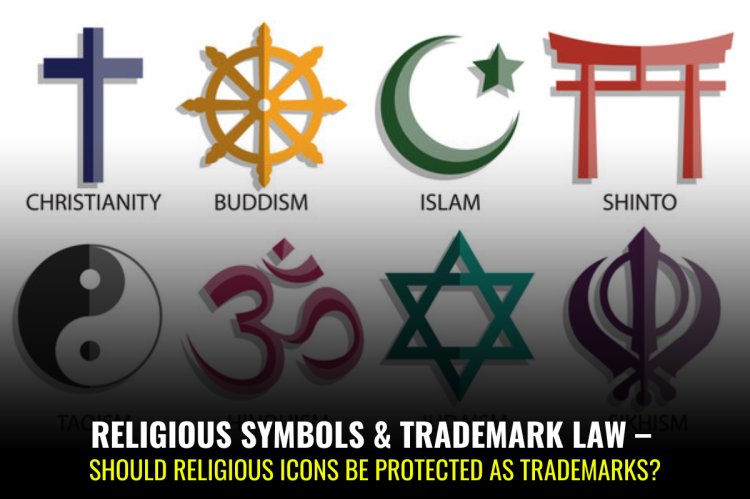"Can You Trademark Religious Symbols? Exploring the Legal Boundaries of Sacred Icons and Intellectual Property Law"
"Discover the legal complexities of trademarking religious symbols. Can sacred icons be owned under intellectual property law? Explore the intersection of faith, culture, and trademark rights."

Introduction
A trademark is a unique sign, symbol, or design that identifies and distinguishes the source of goods or services of one party from those of others. According to Section 2(1)(zb) of the Trade Marks Act, 1999, a trademark is a "mark capable of being graphically represented and distinguishing the goods and services of one entity from those of another."
Trademarks serve as brand identifiers and help businesses establish market presence while protecting their brand identity. In India, trademarks are registered under the Controller General of Patents, Designs, and Trademarks, valid for 10 years and can be renewed indefinitely.
However, a critical legal question arises: Can religious symbols be registered as trademarks? If a business registers a name like "Krishna" or "Ram", does it gain exclusive ownership, restricting its use in religious contexts? This blog explores the complex legal and ethical issues surrounding the trademarking of religious symbols in India.
Benefits of a Registered Trademark
A registered trademark provides several advantages, including:
- Legal Protection: Ensures exclusive rights under the Trade Marks Act, 1999.
- Brand Recognition: Helps build trust and long-term consumer loyalty.
- Prevents Consumer Confusion: Distinguishes brands and prevents misleading representations.
- Enhances Business Value: A well-established trademark contributes to a company's goodwill and market reputation.
What Can Be Registered as a Trademark in India?
Types of Trademarks
- Traditional Trademarks
- Words, slogans, logos, names, numerals.
- Non-Traditional Trademarks
- Sounds, color combinations, smells, motion marks.
- Certification and Collective Marks
- Used to indicate quality, origin, or membership in an organization (e.g., CA, CS, Doctors).
To know more about this you can follow the link below:
Prohibited Trademarks Under Indian Law
The Trade Marks Act, 1999, under Sections 9, 10, 11, and 13, restricts certain marks from being registered.
- Section 9(1): Prohibits non-distinctive marks.
- Section 9(2)(b): Bars trademarks that may hurt religious sentiments.
- Section 11: Prevents marks that are deceptively similar to existing trademarks.
- Section 13: Restricts marks with names of chemicals or pharmaceuticals.
This brings us to a key question: Can religious symbols be trademarked?
The Legal Challenge: Can Religious Symbols Be Registered as Trademarks?
India is a secular nation with multiple religions, and religious symbols hold deep cultural and spiritual significance. Article 25 of the Constitution grants citizens the right to profess and propagate their religion freely.
If a company registers a religious term like "Krishna" or "Ram", it implies exclusive rights over a term that millions use for religious purposes. This raises concerns about violating religious freedoms and potential monopolization of sacred symbols.
Judicial Interpretation: Key Court Rulings
1. Bhole Baba Milk Food Industries Ltd. v. Parul Food Specialities (P) Ltd.
- Plaintiff had three trademark registrations for "KRISHNA" in the dairy industry.
- Defendant argued that "KRISHNA" is a generic religious term and cannot be monopolized.
- Delhi High Court Ruling:
- The plaintiff failed to prove distinctiveness.
- Religious terms cannot be owned exclusively unless they acquire a secondary meaning.
2. Amritpal Singh v. Lal Babu Priyadarshi
- "RAMAYANA" was ruled unregistrable as a trademark.
- Supreme Court Decision: Names of religious texts (Bible, Quran, Ramayana, etc.) cannot be trademarked.
3. Freudenberg Gala Household Ltd. v. Gebi Product
- "LAXMI" vs. "MAHA LAXMI" in the broom industry.
- Court ruled that "LAXMI" is a goddess name and cannot be monopolized.
4. OM Logistics Ltd. v. Mahendra Pandey
- Plaintiff sought exclusive rights over "OM".
- Court ruled that "OM" is a religious symbol and widely used in business names, making exclusivity invalid.
5. Shree Ganesh Besan Mills v. Ganesh Grains Ltd.
- Court ruled that "GANESH" is a public domain term, and no one can claim monopoly over it.
List of Prohibited Religious Trademarks in India
The Central Government’s Trademarks Manual lists religious terms that cannot be trademarked, including:
- Lord Buddha, Shree Sai Baba, Sri Ramkrishna, Swami Vivekananda, Balaji.
- Images or names of Sikh Gurus like Guru Nanak, Guru Gobind Singh, etc.
Should Religious Icons Be Protected as Trademarks?
Arguments in Favor
✅ Prevents commercial misuse of religious symbols.
✅ Protects religious organizations from unauthorized exploitation.
✅ Avoids consumer confusion by preventing false religious endorsements.
Arguments Against
❌ Religious symbols belong to everyone and should not be monopolized.
❌ Trademarking them may violate religious freedom (Article 25).
❌ Could limit the cultural and religious usage of widely known terms.
International Perspective
- India: Prohibits religious trademarks under Section 9(2)(b).
- United States & EU: Religious trademarks are allowed if they acquire commercial distinctiveness.
- Example: ISKCON (International Society for Krishna Consciousness) successfully trademarked its name.
Solutions for Trademarking Religious Symbols
To ensure a balanced approach, trademark applicants should:
Modify generic religious terms by adding prefixes/suffixes (e.g., “Parul’s Krishna” instead of just “Krishna”).
Follow strict legal guidelines to avoid religious conflicts.
Conclusion
Trademarking religious symbols presents a legal and ethical challenge. While businesses often use religious symbols for marketing and branding, courts have repeatedly ruled that generic religious terms cannot be monopolized.
Although religious words may be trademarked if they acquire distinctiveness, the courts balance commercial rights with religious sentiments. Moving forward, clear legal guidelines are necessary to protect both commercial and religious interests.
Should religious symbols be trademarked? The debate continues, but for now, the law prioritizes public domain over commercial claims.












